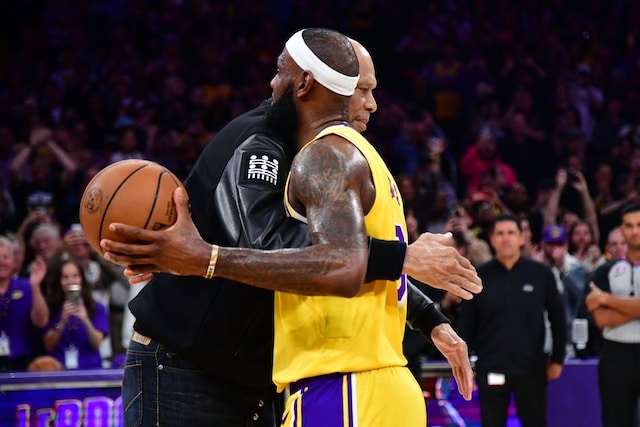The moment that had been decades in the making finally came to pass, and to witness it in person had cost spectators as much as six figures. LeBron James was 36 points away from breaking the all-time NBA scoring record set by Kareem Abdul-Jabbar when the Los Angeles Lakers faced the Oklahoma Thunder on February 7, 2023, at Crypto.com Arena in downtown Los Angeles.
Correspondingly, ticket prices had skyrocketed, with courtside Los Angeles Lakers tickets fetching as much as $100,000 on the secondary markets.
To put the astronomical ticket prices into perspective, to watch the previous Sunday’s Super Bowl between the Philadelphia Eagles and the Kansas City Chiefs in person, which was played in Arizona’s State Farm Stadium, spectators had had to pay upwards of $9,000. That was costly but roughly a tenth of the highest-cited cost to watch James play basketball that week.
Of course, not all seat prices at the Crypto.com arena in Los Angeles were so high — in fact, many were as “cheap” as the most expensive Super Bowl ticket — and $100,000 was for either the game on the day of the record or the game on Thursday night, which, depending on how well James played that day, could have been the record-breaking contest.
What if a spectator had bought the $100,000 seat for Thursday’s game, only for James to break the record that day? Indeed, this was a scenario that most couldn’t even begin to comprehend.
What would the combined fees be for two of those $100,000 tickets when calculated? Despite taking a percentage of the resale, secondary markets also charged the buyer an extra $23,000 in fees per ticket; as if spending $200,000 wasn’t enough, the buyer had had to pay another $46,000 on top of it.
The question remained: aside from being a once-in-a-lifetime event, how were the $100,000 ticket prices justified?
Many ticket agents and brokers increase ticket prices based on demand, something they call “dynamic pricing.” This strategy had landed them in legal trouble and continued to stir controversy.
Dynamic Pricing
Dynamic ticket pricing refers to setting flexible product or service prices based on market demands. In this context, it means adjusting the price of NBA game tickets in real time based on various factors such as team performance, opponent, day of the week, weather, etc. Essentially, the better the team or, the more popular the match-up, the more expensive the tickets become.
Brokers and resellers charge numerous fees, such as a processing fee, while taking a large percentage from resale transactions to exacerbate matters. Many teams and leagues allow resales and encourage them, a profit-boosting tactic through which some ticket sellers charge the buyer an extra 20%.
Taylor Swift Debacle
It’s not only sports. Remember the Ticketmaster / Taylor Swift ticket debacle?
Not only did the Ticketmaster site crash at the launch of the sale of her tour tickets but prices were rapidly increased to the point that the Department of Justice reportedly began an investigation of the sales and distribution company for abuse of power in the industry. It seemed as though ticket price hikes and resale amounts that Ticketmaster approved should have been capped at a certain, albeit exorbitant, dollar amount. However — there was no such cap. This allowed Ticketmaster to charge whatever they chose and make a fortune freely.
Alternatives?
However, to watch LeBron James break the legendary Kareem Abdul-Jabbar’s NBA scoring record of 38,387 points without (shockingly) spending a mini-fortune, one could have tuned in to TNT that night to catch their game against the Oklahoma City Thunder. If LeBron disappointed those who spent a mini-fortune that night, they could have tuned in to TNT on Thursday night when the Lakers hosted the Milwaukee Bucks.





